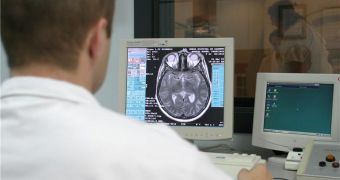Spain began in 2008 the national MIND project, an initiative aimed at approaching Alzheimer's disease from a multi-disciplinary perspective. Valued at 27 million euros, it comprises some twelve biomedicine companies and their corresponding, public, research organizations, and is scheduled to last for about four years. As part of this project, experts at the Universitat Jaume I (UJI), in Castello, have begun work on a new, early-detection method for the neurodegenerative disease, which relies on brain scans made with Magnetic Resonance Imaging (MRI) machines.
UJI Professor Vicente Belloch says that, within a year or so, the university research group has already developed “a proposal of functional resonance protocol that establishes what technical details must be followed to better study memory in Alzheimer patients. The complexity involved here is to design tasks that stimulate immediate memory exactly, which is the specific brain area that we want to study.” In charge of the investigations are experts from the Department of Basic and Clinical Psychology and Psychobiology, which run their tests on volunteers wearing headphones and glasses.
Each of the participants is subjected to a series of stimuli while inside an MRI machine, as experts try to determine the underlying mechanisms behind memory formation, and the possible causes that drive the cortex to start degenerating in some people, at an older age. The resulting tasks will be applied to a three-group study upon completion. One of the groups will be made up of healthy seniors, the other of people with only mild cognitive impairment, while the third will feature Alzheimer's patients. The goal is to “compare how the temporal lobe is stimulated depending on the tasks performed,” the experts say.
“Approximately one third of [people with symptoms of mild memory loss] develop Alzheimer’s disease and, to date, we still have no way of knowing very well which of them will.” “The objective of these studies is to be able to predict which patients will develop Alzheimer’s disease so we can start treating them earlier,” the Eresa Foundation President, neurologist Jose Miguel Lainez, explains. Hopes are high that, when the conclusions of the new research come in, they will be combined with others, from similar studies, and that the combination will bring about an efficient, early-detection method.
“Current treatments are not very effective because they are applied too late, in the last stage, and these medicines have a symptomatic effect but do not act on the process itself,” Lainez says of the reasons behind the MIND project, AlphaGalileo reports.

 14 DAY TRIAL //
14 DAY TRIAL //